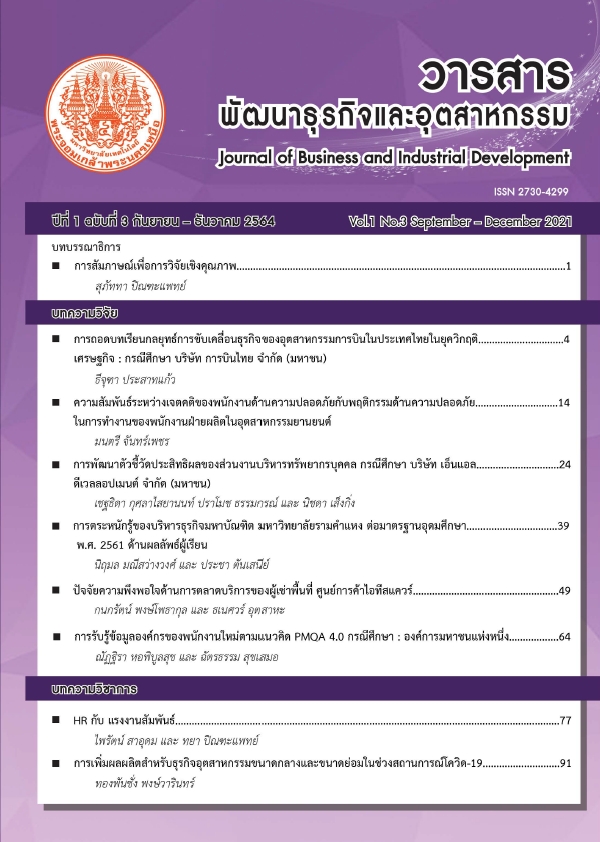New Employees’ Corporate Information Recognition Using the PMQA 4.0 Policy: A Case Study of a Public Organization Encouraging Science and Technology Transfer and Development
Keywords:
Corporate’s Information Recognition, PMQA Concept, New Employees, Public OrganizationAbstract
The study aimed to explore new employees’ recognition levels of corporate information on the basis of PMQA 4.0. The population consisted of 30 staff members who started working in the year 2019-2020. The research instrument was a set of questionnaire survey. Statistical measures for data analysis encompassed percentage, mean, standard deviation. As results, the majority of respondents were female, aged 20-30 years, possessing one year's experience and pursuing social science career paths. Considering overall factors, new employees’ recognition of corporate information was at a high level, listed in descending order of priority as follows: 1) Perception of organizational environment; 2)Perception and Recognition of overall organizational description; 3) Perception of overall organizational situation; 4) Perception of organizational relationship; and 5 Perception of information of overall strategic context. In conclusion, the new employees were able to recognize corporate information with the implementation of PMQA 4.0. Therefore the policy and procedures were considered applicable in the workplace.
References
Aguinis, H. (2017). Performance Management. (Eds. 4th). New Jersey : Pearson Education.
สำนักงานคณะกรรมการข้าราชการพลเรือน (สำนักงาน ก.พ.). (2544). คู่มือการสร้างระบบบริหารกิจการบ้านเมืองและสังคมที่ดีตามระเบียบสำนักนายกรัฐมนตรีว่าด้วยการสร้างระบบบริหารกิจการบ้านเมืองและสังคมที่ดี.กรุงเทพฯ: สำนักงานคณะกรรมการข้าราชการพลเรือน.
สำนักงานคณะกรรมการพัฒนาระบบราชการ (สำนักงาน ก.พ.ร.). (2564). การประชุมชี้แจงกรอบการประเมินองค์การมหาชน ประจำปีงบประมาณ พ.ศ. 2564. ก.พ.ร. องค์การมหาชน. https://po.opdc.go.th/content/MTY2Mg.
Baldrige Award (2015, 15 November). Baldrige Excellence Framework: A Systems Approach to Improving Your Organization's Performance. National Institute of Standards and Technology (NIST). https://www.nist.gov/baldrige/2017-2018-baldrige-excellence-framework
แสงเดือน ทวีสิน. (2545). จิตวิทยาการศึกษา (พิมพ์ครั้งที่ 5). กรุงเทพมหานคร: โรงพิมพ์ไทยเส็ง.
Bloom, B.S. (1956). Taxonomy of Educational Objectives, Handbook: The Cognitive Domain. New York : David McKay.
บุญชม ศรีสะอาด. (2542). วิธีการทางสถิติสำหรับการวิจัย (พิมพ์ครั้งที่ 2). กรุงเทพมหานคร: สุวีริยาสาส์น.
เอื้อการย์ สันติศิริ. (2545). การสื่อสารกับการรับรู้ต่อการเปลี่ยนแปลงภายในองค์การ: กรณีศึกษา บริษัท โรงพยาบาลไทยนครินทร์ จำกัด. [ปริญญานิพนธ์มหาบัณฑิต ไม่ได้ตีพิมพ์]. มหาวิทยาลัยบูรพา.
สุภชา เกรียงไกร และคณะ. (2558). ปัจจัยที่มีผลต่อการมีส่วนร่วมของบุคลากรในการพัฒนาคุณภาพการบริหารจัดการภาครัฐ (PMQA) ของกรมชลประทาน. (โครงการศึกษาวิจัย, ส่วนวิเคราะห์นโยบายกองแผนงาน). กรุงเทพฯ : กรมชลประทาน.
จุฑาจิตร ประดิษฐ์เจริญ และบังอร โสฬส. (2560). บทบาทของอัตลักษณ์องค์การ และความมุ่งมั่นทุ่มเทในการทำงานที่มีต่อพฤติกรรมการเป็นสมาชิกที่ดีขององค์การ. [วิทยานิพนธ์ปริญญามหาบัณฑิต ไม่ได้ตีพิมพ์]. สถาบันบัณฑิตพัฒนบริหารศาสตร์.
มุทิตา คงกระพันธ์. (2554). การศึกษาอิทธิพลของการรับรู้ความสัมพันธ์ระหว่างบุคคล การรับรู้การสนับสนุนจากองค์กร ผ่านความผูกพันต่อองค์กร และความพึงพอใจในงานที่มีต่อผลการปฏิบัติงานตามบทบาทหน้าที่. [วิทยานิพนธ์ปริญญามหาบัณฑิต ไม่ได้ตีพิมพ์]. มหาวิทยาลัยศิลปากร.
เอกลักษณ์ ธรรมมา และนิตยา สนเธาว์. (2563). ประสิทธิผลการนำนโยบายเกณฑ์การพัฒนาคุณภาพการบริหารจัดการภาครัฐไปปฏิบัติตามหลักธรรมาภิบาลของเรือนจำกลางเพชรบุรี. [วิทยานิพนธ์ปริญญามหาบัณฑิต ไม่ได้ตีพิมพ์]. มหาวิทยาลัยนานาชาติแสตมฟอร์ด.
Downloads
Published
How to Cite
Issue
Section
License

This work is licensed under a Creative Commons Attribution-NonCommercial-NoDerivatives 4.0 International License.





